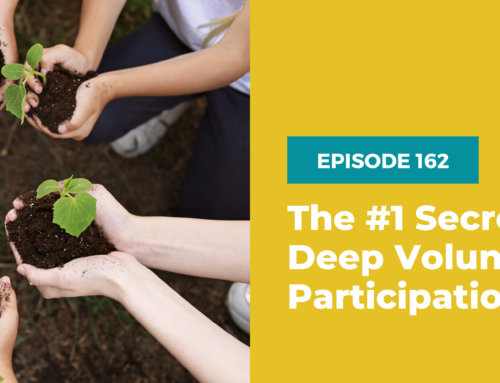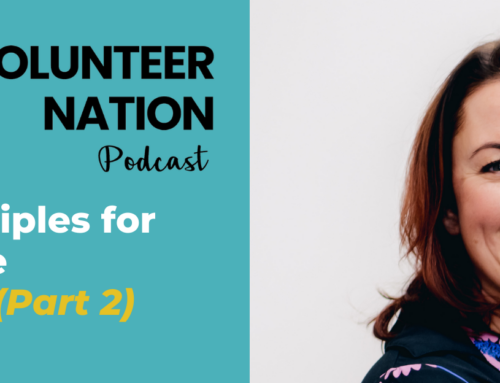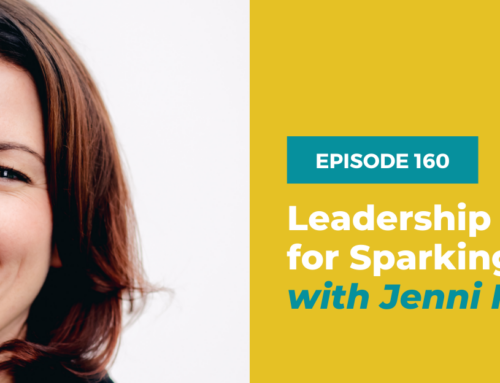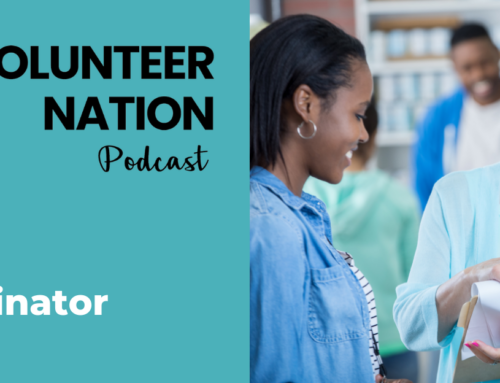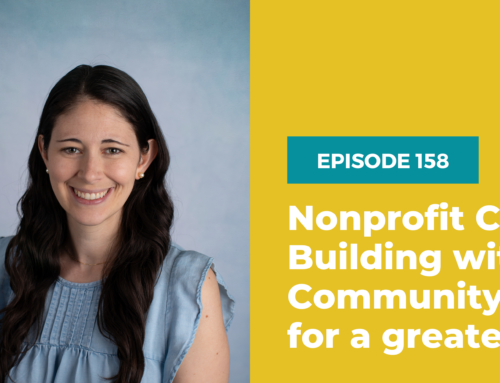
December 26, 2024
Episode #142: Our Top 6 Volunteer Nation Podcast Episodes from 2024
In this holiday-themed episode of The Volunteer Nation Podcast, host Tobi Johnson shares the top 6 Volunteer Nation Podcast episodes from 2024! Themes include transitioning from doer to nonprofit leader, transforming volunteer leadership, successful volunteer coordination, effective volunteer management, boosting volunteer signups, and volunteer retention strategies.
As we come to the end of the year, we want to say thank you for tuning in and continuing to support us. Wishing you all the very best for 2025!
Volunteer Nation Podcast – Episode Highlights
- [00:23] – Holiday Spirit and Podcast Overview
- [01:03] – Top Volunteer Nation Episodes of 2024
- [02:08] – Episode 94: From Doer to Nonprofit Leader
- [05:09] – Episode 97: Transforming Volunteer Leadership
- [10:53] – Episode 93: Five Phases of Volunteer Coordination
- [16:13] – Episode 105: Seven Habits of Effective Volunteer Managers
- [19:28] – Episode 95: Boosting Volunteer Signups
- [24:29] – Episode 99: Volunteer Retention Strategies
- [30:41] – Conclusion and New Year Wishes
Helpful Links
- VolunteerPro Membership Community
- Volunteer Nation Podcast Episode #94: How to Make the Shift from Doer to Nonprofit Leader with Patricia Gentry
- Volunteer Nation Podcast Episode #97: Transforming How We Lead Volunteers with Martin J Cowling
- Volunteer Nation Podcast Episode #93: The 5 Phases of Successful Volunteer Coordination
- Volunteer Nation Podcast Episode #105: 7 Habits of Highly Effective Volunteer Managers
- Volunteer Nation Podcast Episode #95: 6 Ways to Immediately Boost Volunteer Signups
- Volunteer Nation Podcast Episode #99: Volunteer Retention Strategies: Two Big Mistakes
About the Show
Nonprofit leadership author, trainer, consultant, and volunteer management expert Tobi Johnson shares weekly tips to help charities build, grow, and scale exceptional volunteer teams. Discover how your nonprofit can effectively coordinate volunteers who are reliable, equipped, and ready to help you bring about BIG change for the better.
If you’re ready to ditch the stress and harness the power of people to fuel your good work, you’re in exactly the right place!

Contact Us
Have questions or suggestions for the show? Email us at wecare@volpro.net.
Rate, Review, & Follow Us on Apple Podcasts
If you love the content Tobi shares on the Volunteer Nation podcast, consider rating and reviewing the show! This helps us reach more people – and help more good causes just like yours – successfully engage enthusiastic, dedicated volunteers with less stress and more joy.
Click here, scroll to the bottom, tap to rate with five stars. Then, select “Write a Review” and let us know what you loved most about this episode!
Also, if you haven’t done so already, follow the podcast so you don’t miss a thing. Follow now!
Subscribe to ProNews: Our Weekly Resource Roundup
If you’d like to stay up to date on all new podcasts, blogs, freebies, and deals posted on our Tobi Johnson & Associates and VolunteerPro websites, subscribe to our weekly ProNews newsletter.
Every Wednesday, we’ll send you a digest of our freshest content, plus a bonus! Once you confirm your subscription, you’ll get our [Free eBook] The New Volunteer Manager: The First 90 Days.
Episode #142 Transcript: Our Top 6 Volunteer Nation Podcast Episodes from 2024
Tobi: I don’t know about you. But it is the holiday season and I am in the spirit. I have been walking around singing Christmas carols and maybe it’s because I’m heading back to see family. Maybe it’s because things slow down just a little bit and I can catch up with myself during the holidays. Maybe it’s that. I’m thinking about a time I can spend with my husband and my kitty cat where we’ll actually have time off and have quality time.
I don’t know what it is, but I’m really feeling the holiday spirit this year. So I’m excited about that. This episode, I want to talk about our Volunteer Nation podcast. In fact, what I want to do is cover our top six Volunteer Nation podcast episodes from 2024. What about that? I went through all the data.
Now certainly the podcasts that we’ve posted most recently in November, December, aren’t going to have enough listeners to really compete, but we have some good ones here. And if you’re a new listener. This might give you some ideas of things you want to go back and listen to in our back catalog Or if there’s a topic you maybe you’re a longtime listener and you happen to miss the topic that might be of interest so it’s a good mix It’s a mix of solo shows and a few interviews And these are the ones that our fans found the most interesting because they got the most downloads. Let’s get to it And happy holidays. So here’s my short list of our top volunteer nation podcast episodes of 2024.
Episode 94 – How to Make the Shift from Doer to Nonprofit Leader with Patricia Gentry
She was on to talk about mindset and really how we can stop doing all the working in our programs and start working on our programs. You know, we advocate this a lot at Volunteer Pro, and Patricia is my sidekick here or has been my sidekick recently at Volunteer Pro and she has a lot of wisdom to share. She’s also a leader who trains other volunteer leaders and, and does a lot of work on positive psychology. So she’s, she had a lot of wisdom to share and she talked about understanding the leader zone versus the doer zone, which cracks me up.
It kind of reminds me of when you get in the friend zone with people and you really want a date. That’s what it kind of reminds me of, but she talks about that. She talks about addressing the blame game in nonprofit organizations and she talks about overcoming the scarcity mindset. So I thought I might share a little clip from this particular episode where Patricia talks about the scarcity mindset and what we need to do to overcome it.
So have a listen and I’ll be back after. See you in a minute. You want to talk a little bit about scarcity mindset? Yeah. I mean, I think it shows up. Yeah. A lot in the nonprofit sector, this idea of you don’t have enough resources, there’s not enough time. You don’t have enough capacity. You know, it’s this sort of non enoughness, right?
And there’s some realities to that. There are limited budgets, there are limited staff, but there’s also sort of the opposite of that, which is this more abundant mindset and, and working within what you have, right? Sure. Making sure that you have leveraged the resources that you have. I think volunteers are a great space to extend the resources that you could have at your fingertips for your organization.
Tapping into the expertise of other volunteers to help you do your work more easily. I think we are leaving resources on the table because we think so. Much into that scarcity mindset of there’s just not enough time. There’s not enough. There’s not enough right that we forget that we’re leaving a lot on the table.
If we just sort of shifted our mindset a little and got to that place where, okay, we have enough resources. Let’s build awareness around what we need. How can we plan ahead, get more folks involved in the work that we need to get done this year? I think there’s a little bit more possibility in, in sort of the opposite of that scarcity mindset.
Okay. Let’s talk about our second volunteer nation podcast episode. So we’re going, we’re, we’re, I’m going to share six. I’m starting with going all the way to the top to number one. So it’s sort of like a countdown. So that was number six. This is number five. The fifth most listened to episode in 2024.
Episode 97 – Transforming How We Lead Volunteers with Martin J. Cowling
Martin’s a really fun person to talk to because he goes around the world and does training on leadership, change management, volunteerism, consulting, and he’s got a really global perspective. And we talked a lot about how things were a more, different around the world when it comes to volunteer engagement.
But he also had some critiques for us and he talked about the challenges of traditional volunteering models. He also talked about understanding the new generation of volunteers and what they need. That’s different than maybe former generations. And he talked about the importance of measuring volunteer impact.
And I think that’s a really great excerpt to share with you because he goes into detail about the types of impacts volunteers make and why it’s so important that we are able to not only track that impact, but communicate it to others and how that is so essential to our growth as a sector. And so I brought a little episode I want to share with you.
So here it is, my interview with Martin J. Cowling. Just a little snippet about measuring volunteer impact. And I’ll be back right after. Enjoy. So the first is I think we need to be selling the impact of volunteering more than we ever have. And we don’t. We undersell volunteering. So, volunteering has three impacts.
The first is it impacts the, the, the person who’s volunteering. And if our volunteering is not impacting the person who’s volunteering, then it’s not actually working. So, as a result of volunteering, I should walk away. Now, sometimes I’m going to walk away going, what the hell was that? That’s an impact. I should be knowing that the time I’m giving to the organization is making a difference to the community.
So I need to be able to be told that or to see that in some way. Now I can do that, you know, for example, let’s say it’s a holiday gifts thing, that families come and they get gifts, you know, that’s obvious. I could go home and go, I helped give 50 gifts to 50 families that couldn’t afford the holidays.
You know, there are other ways that we need to say to people, this is how we impact, this is how volunteering will impact you as an individual. Now, we kind of do these vague things like you’ll make friends, you’ll get skills. No, if I volunteer to do a role in the organization, you should know the data. You should know that 30 percent of volunteers who did this role over the last two years reported Feeling happier about themselves.
50 percent of volunteers as a result of volunteering for organization got a full time role in this sector. 20 percent of volunteers reported that their marriages were improved as a result of volunteering. You know, in your volunteer survey, one of the questions you should be asking people is what has been the impact of volunteering on you and then using that to market volunteering.
And if If your volunteers come back to you and say a volunteer was actually awful, I hated doing it, I do it out of duty, then you need, you have a problem, you need to change things. But we need, you know, when we do those volunteer surveys with people, one of the things I did in one organization was we actually set up a team of people that rang every single, called every single volunteer.
Mm hmm. And said, how is volunteering working out for you? And as a result of their feedback, we made extensive changes to our programs. I’d agree with volunteers to do that. So the second, that’s the first impact of volunteering. The second is the volunteering has to impact the organization positively. Now, again, how are we measuring that in the organization?
Have you actually asked your paid staff, what is the impact of volunteering on your program? What is the impact of volunteering on your department? Now, some departments will come back to you and go, I don’t engage the volunteer department because they’re paying the Mm hmm. Trying to find the right word.
The pain in the backside. Now, that’s very useful feedback. You know, how do we change the volunteer program to do that? I was in one organization where the volunteer, the organization was so fed up with the volunteer department that there were like six different volunteer programs in the organization.
People were secretly recruiting their own volunteers because They didn’t want to go through the official systems because it was too painful. So we need to be looking at what’s the impact on volunteering on our organization. Now the fundraising department’s easy. You can tell me that you raised a million dollars.
Now the way we talk about the impact with organizations is they go, we had 267 volunteers that gave five hours. That’s worth 2. 2 million dollars. It doesn’t mean anything. It doesn’t mean anything to a donor. It doesn’t mean anything to a potential volunteer. Last year, our volunteer program taught 65 people in our community to read, and 33 of them got full time jobs, and 10 of them who are homeless and are home.
Absolutely. Now, if I’m the governor of a state and I hear a statistic like that, I’m going to go, that’s fantastic. If I’m a head of a trust, I’m going to go, that’s fantastic. If I’m a volunteer, I’m going to, I want to be part of that. Because none of us want to see homeless people. You know, we want to see people’s lives changed.
So talk about the impact on your organization and talk about the impact on your community. What are you doing to make a difference to the community? If you can’t measure the difference you’re making to a community, I would challenge us, are we actually in the right business? Are we actually doing something that’s useful or are we just perpetuating the need of our organization to survive?
All right, my friends, wasn’t that good? He’s so smart. It was a great conversation. So, that was my fifth. Number four in my countdown of the top fan faves from 2024 was episode 93.
Episode 93 – The Five Phases of Successful Volunteer Coordination.
That’s a solo episode I did. And I shared our volunteer strategy success path, structure, infrastructure, model. I guess I would call it a model. It’s the model that we use inside our volunteer pro community to assess the maturity to help our members assess the maturity of their volunteer operations and strategy and engagement. And in this. I talk about all five phases, but in this snippet or this excerpt from that episode, I talk about our final phase, which is phase five, scale leadership.
And the reason I talk about, or the reason I chose this particular snippet is because I think this is the most neglected in terms of our organization’s volunteer strategies. I talk about in this excerpt, what is scaling leadership look like and how we engage others in scaling that leadership and why it’s so important.
It’s not only around scaling volunteers, it’s also scaling the leadership of our co workers, because that’s probably the only way you’re going to grow because you can’t really. clone yourself. And so we’ve got to, as our organizations grow, our volunteer teams, we’ve got to have more and more people in leadership roles because you can’t do it all, nor can an individual supervisor in a department.
So leadership is so important, but it’s an area that we really have a lot of work to do in. And so I thought it might be interesting to share with you that little excerpt from that episode. Our final phase is phase five, scale leadership. This is about ownership and impact. This is something that a lot of people don’t talk about very often, and it’s often left out of models for volunteer engagement, but I think it’s really important and it is one of the more advanced areas.
levels. So if you’ve been working, uh, with volunteers for a while, this may be an area you want to work on, or it may just simply be for your organization, one of your strategic goals. So let’s get into it. What, what does scale leadership look like? It’s about ownership and impact. It’s about purposeful leadership development and collaboration for sustainable impact.
So what does that mean? In this phase, you take steps to delegate and distribute responsibility. throughout your team if you are the volunteer coordinator or you have a volunteer services department. Scaling is about duplicating or not duplicating effort and getting more people on the bus and moving forward.
So scaling is really about making sure that there’s not just one person responsible for everything because that person has only so many hours in the week. And so if you want to scale beyond that, you’re going to continue to be limited by that person’s hours, productivity, It’s energy, resilience, et cetera.
But when you spread out responsibility and you start to bring on leaders and teams and start to grow, when you can distribute that responsibility and accountability, you can build in more teams. deeper depths of resilience. You have a deeper bench. And so as volunteer engagement grows at your agency, it’s impossible to keep tabs on everything.
That’s where a trained and highly effective team of volunteer leaders and co workers can help. So it’s really about building leadership from within. So you’ll also want to look outside your organization and develop mutually beneficial partnerships that can help you meet your goals. Oh, okay, everybody.
Those are number six, number five, and number four of our top fan faves from the Volunteer Nation podcast in 2024. After the break, I’m going to talk about our top three. So don’t go anywhere. I’ll be right back.
Volunteer Pro Premium Membership
If you’re enjoying this week’s episode of Volunteer Nation, we invite you to check out the Volunteer Pro Premium Membership. This community is the most comprehensive resource for attracting, engaging, and supporting dedicated high impact volunteer talent for your good cause. Volunteer Pro Premium Membership helps you build or renovate an effective community. What’s working now, volunteer program with less stress and more joy.
So you can ditch the overwhelm and confidently carry your vision forward. And it’s the only implementation program of its kind that helps your organization build maturity across five phases of our proprietary system, the volunteer strategy success path. If you’re interested in learning more, visit volpro.net/join
Okay, we are back with my countdown of our top six Volunteer Nation podcasts from 2024. We are down to number three, the third most downloaded podcast this year.
Episode 105 – Seven Habits of Highly Effective Volunteer Managers
And in this one, I kind of took a page from Stephen Covey’s Seven Habits of Highly Effective Managers. I thought about volunteer managers and some of the things I recommend to our volunteer pro members and our students. And I talked about minding your mindset as a habit. I talked about setting healthy boundaries. I talked about some other things. But in this excerpt, I want to call out and just share a little snippet from that episode on setting healthy boundaries because it’s so important that we do this. Without healthy boundaries, we are headed for burnout. And there are so many ways in volunteer engagement that boundaries can be transgressed. And we must set the stage and be the role model for our volunteers and our co workers around, you know, setting boundaries, and we want to be healthy in our work as well because we need to be present and not depleted.
Take a listen and see if this resonates with you at all. Talk a little bit about healthy boundaries. So let’s talk about number two habit for volunteer managers, which I think is really important as well, which is setting healthy boundaries. Boundaries. And what do we mean by boundaries? We mean professional boundaries.
Boundaries around our time, availability, emotional energy, the number of tasks we put on our list, the turnaround time we’re promising people, the commitments we make of volunteer talent to other departments in our organization. All of those things are boundary setting. Okay, there’s other boundaries as well you might think of.
We don’t do a very good job, I think, in our field of setting those boundaries. And that can lead to burnout, negativity, and just a lack of joy. We want to have joy in our work because what we do is really important. Should be celebrated, right? So we have to set boundaries to show others how we want to be treated by treating ourselves well first.
And so we’ve got to share with people what treating us looks like, what treating us well looks like. So setting boundaries is a way to do that. So that’s my second habit for volunteer managers. Well, I hope that resonated a little bit with you. Lately, when I talk about boundaries with folks, it really does resonate.
It’s an area that we need to work on, I think. We’re kind of raised in this space to be giving to everyone, to be philanthropic in our own work, but we also have to teach others how to treat us. And we need to put our needs first sometimes. So, I hope that excerpt helped, but Also, go ahead and go listen to that episode and see if there’s anything else that resonates.
All right, I’m down to my top two. The second most downloaded episode of 2024.
Episode 95 – Six Ways to Immediately Boost Volunteer Signups
Now, it doesn’t surprise me it’s related to volunteer recruitment because it’s such a huge challenge for everybody. There’s a few tactics I will talk about. Here’s just a few in that episode. I talk about diagnosing what’s working and what’s not. That’s a tactic that’s really important. to boosting your recruitment results. Tactic number two is increasing the number of personal asks you make and others make. And tactic three is tracking and decreasing response time. And this snippet that I pulled from this episode is about That efficiency factor of tracking and decreasing the response time to volunteer inquiries.
And I go into detail and give some tactics for how to do that because we live in a world where people expect information and expect results pretty quickly. And so we’ve gotta keep pace. So I’ve got some ideas for you in this episode, so have a listen and when I come back after this excerpt, I’m gonna share the number one top Volunteer Nation episode downloaded in 2024.
So don’t go anywhere and enjoy the snippet. I’ll be right back. Tactic number three to boost volunteer signups is to track and radically decrease response time. Now what I mean by response time is the time from when someone reaches out or submits an application to the time someone submits it. The goal should be one business day.
Nobody in this world is going to wait more than one business day. Most people are going to be off to the next thing, or they’ll forget about you, or they’ll find another volunteer opportunity. You’ve got to put together a team that can contact people. Now, the contact doesn’t necessarily have to be via phone or via text.
It could be via email. So you can reach out to people in this case, just to let them know, Hey, we’re so excited to meet you. We’ve received your application or your interest form, or we’ve seen you RSVP for our upcoming info session. We’re super excited to meet you. Here’s a few things to think about. And by the way, here’s a story about the impact of volunteers.
It’s that simple. But they’ve got to feel like they didn’t submit their application into a dark black hole. Because that happens a lot. That happens a lot. Volunteers are frustrated by this. So if you can show them that you are eager to have them on board, you’re going to boost the number of signups. The other thing you want to do if this is not improved, if you’re over one business day as a standard for response time, set up a calendar booking.
Set up a calendar booking on your website. Allow people to book a time with you for a 15 minute quick call to learn more about volunteering and see if it’s a good fit. This is not necessarily you’re responding to them, but you’re getting them action. They’re able to take action quickly and that satisfies that need for support speed, because people in today’s world have a need for speed. And so if you can set up a calendar booking link, like Calendly, I use Calendly for my bookings and I will set aside certain times of the week where I will take bookings. You don’t need to necessarily have appointment options for every day of the week.
You can choose a few days of the week and have people choose from those. And then you can also, once people submit their booking, you can send them a thank you, you can redirect them to a webpage where you have thank you and more information about volunteering, a video, et cetera. Some software will allow you to do this.
You can trigger a series of emails or at least one email before you have your chat with your prospective volunteer. There’s a lot you can do to build relationships with these booking softwares. So think about. Decreasing response time and meeting that need for speed from the community, from the public.
People want responsiveness. Think about when you buy something on Amazon. You know when it’s shipped, you know when it’s orders placed, you can track the package all the way to your front door stoop. People have acclimated to knowing everything about a process and to know where they’re at in a process.
So think about that in terms of improving the volunteer journey as well. But to immediately boost volunteer signups, give people the ability to be in contact within a day or book time on your calendar. Okay, I am back with the final, the top, the pinnacle, the champion of this year’s Volunteer Nation podcast.
This is the episode that was most downloaded, that people found most interesting. And it’s interesting to me that it’s the most interesting.
Episode 99 – Volunteer Retention Strategies, Two Big Mistakes
I’m going to spill the beans right now and tell you what those two big mistakes are. One is communicating the wrong norms. That’s our first mistake. Second mistake I cover in that episode is not tapping the emotional side of the brain, and this excerpt that I pulled from this episode is about that emotional side of the brain and why it’s so important. It’s so important to tap emotion in our communications and in when we are hoping to influence people and drive action.
So give a listen and let me know what you think. I’ll be right back after this takeaway or after this snippet. So let’s talk about volunteer retention strategy mistake number two. Which is not tapping the emotional side of the brain. You know what makes volunteers continue again and again to choose your organization?
Because when we think about volunteer retention, what people are doing is making a choice to support you on a consistent basis. And they’re making that choice over and over again over other things in their lives. So, We often think that a rational argument, whether it’s in our recruitment or retention, a rational argument about need is the only way or the best way to reach people and influence people.
Actually, even more important, To have emotion, to tap emotion, there’s an emotional level, emotion drives action more than reason driving action. And yet, just go take a look at your volunteer recruitment page on your website. Is it emotion or is it reason? Is it about facts and requirements or is it about stories and inspiration?
And that makes all the difference. So it turns out that the prefrontal cortex, which is the executive part of our brain, it’s responsible for personality, reasoning, abstract thought, goals, planning. We think that this is the most, the part of the brain that’s most responsible for a volunteer’s desire to contribute, but rather psychologists know that it’s our limbic system that triggers empathy and develops a person’s willingness to help.
And our limbic system is what we consider our old brain. It’s an older part of our brain. It’s more, you know, It, it was an earlier development in our evolution as human beings, as a species. So what they found is that only when the limbic system is triggered, only then does the prefrontal cortex get to work rationalizing our choices.
So in a way, you know, they talk about two brains. Your gut is one of your brains. In the end, the heart decides first and then the intellect justifies. And so, we need to start tapping the emotional side of the brain to start or continue a conversation with our supporters about helping and service. in extending that imitation.
And we really first must capture the brain’s attention and light it up with emotion. In order for people to act, they really have to feel emotion. So if you go to your website or you look at your materials or you look at your messaging, your newsletter, your emails, your phone calls, whatever they are, your training, If there’s no emotion there, the brain and its systems cannot make decisions.
We also know that even our hormones that are, some of our hormones anyway, are actually supportive of taking action. Some aren’t, like adrenaline is a hormone that’s not really, you know, fight or flight. Sometimes adrenaline, when people are really stressed out, they’re not going to take, take action. Let’s get back to this topic of how do we light up the brain with emotion so that the prefrontal cortex gets involved and says, yes, we’re going to do this because again, the heart decides, the intellect justifies.
So whatever people feel in their gut is going to cue to them. Whether or not they should take action. Fortunately, our brains are actually very lazy. They’re very lazy. We, we respond in very stereotypical ways. Our brains take shortcuts all the time. Because if we were to process every piece of data that came into our brains, our brains would explode.
And so our brains are really good at short cutting data, and so when we feel an emotion that doesn’t feel good, we just short cut it to say, eh, not even sending it to the prefrontal cortex, taking any action on this, it doesn’t feel good. And, you know, if you think about working through getting outside of your comfort zone, that’s when you are actually actively moving past that negative emotion, getting it into your prefrontal cortex and mulling it over.
And you have to take really specific, like, careful steps to make that. And how often do we just, you know, unconsciously say, not doing that, that doesn’t feel good. So, certainly we can move past things that don’t make us feel good, but there has to be a lot of, a lot of motivation to do so. So really what we want to do is work with human nature, not against it when it comes to volunteers.
Okay, I hope that was interesting, maybe reminded you of some things, maybe gave you some ideas. Maybe it’s just a reminder that we need to think about how our brains work, because they really do drive the action steps we take. And so we’ve always got to figure out how to engage with people’s hearts before we engage with their minds, actually.
So those are our top eight. Six volunteer nation episodes for 2024. Again, I think we probably did a little short shrift for the episodes in November, December, because they didn’t really get enough time to get enough traction, but it is what it is. This is the best we can do. I hope you enjoyed these.
Maybe you have missed some of these episodes in the past and want to circle back and listen, and I hope you found them helpful. So it is the end of the year. Happy New Year. I hope you have the best year yet in 2025. I hope that you are able to engage people in your community that are as passionate as you are about your good cause.
And I hope you make connections with people that are wonderful, giving, caring, compassionate, because those are the kinds of people we like to have in our life, don’t we? All right, take care, everybody. And I will see you next week. Same time, same place on The Volunteer Nation.


